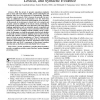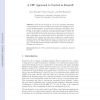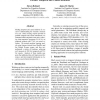911 search results - page 56 / 183 » The Semantics of Event Prevention |
FLAIRS
2004
14 years 11 months ago
2004
Many dramatizations have depicted a fully automated home living environment, where actions and events are understood or even anticipated. While the realization of such environment...
TASLP
2008
14 years 9 months ago
2008
With the advent of prosody annotation standards such as tones and break indices (ToBI), speech technologists and linguists alike have been interested in automatically detecting pro...
IFM
2010
Springer
14 years 8 months ago
2010
Springer
Event-B has emerged as one of the dominant state-based formal techniques used for modelling control-intensive applications. Due to the blocking semantics of events, their ordering ...
ACL
2008
14 years 11 months ago
2008
Finding temporal and causal relations is crucial to understanding the semantic structure of a text. Since existing corpora provide no parallel temporal and causal annotations, we ...
ECSQARU
2007
Springer
15 years 4 months ago
2007
Springer
Dynamic epistemic logic (DEL) as viewed by Baltag et col. and propositional dynamic logic (PDL) offer different semantics of events. On the one hand, DEL adds dynamics to epistem...



